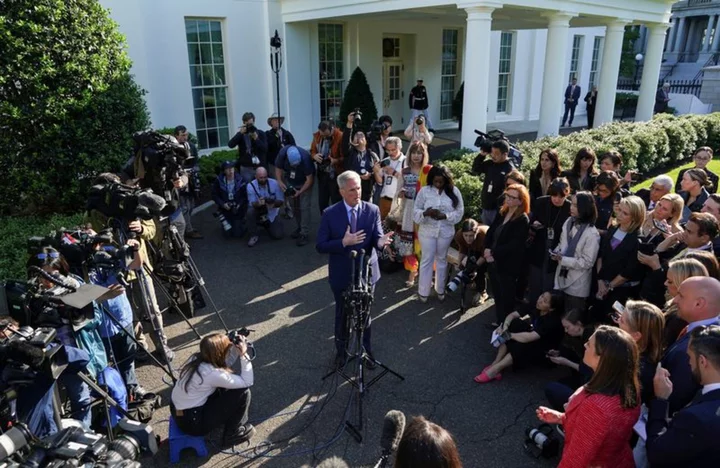Stocks sank again Friday after another report pointing to a resilient US jobs market added to the misery for investors who fear the Federal Reserve is not finished with its campaign of monetary tightening.
The losses extended a sell-off endured for most of the week as various indicators suggested the world's top economy was in rude health and the battle against inflation was still far from won, while Chinese data showed continued weakness.
It followed a tough day on Wall Street, which was also hit by a sharp drop in Apple fuelled by concerns about China's decision to ban government departments from using iPhones.
Traders are now gearing up for policy decisions by major central banks towards the end of the month, with the Federal Reserve concluding a much-anticipated meeting on September 20.
Markets largely expect data-driven US officials to keep rates on hold at a two-decade high, having seen inflation come down in response to more than a year of hikes and signs of a softening labour market.
However, the latest set of strong readings -- including on the services sector and jobs -- and a surge in oil prices have sparked fears the Fed will announce one more hike before the end of the year or keep borrowing costs elevated for an extended period, risking a recession.
Those worries were compounded Thursday by news that jobs claims came in below forecasts last week.
"The higher-for-longer interest rate narrative and the inevitable lag effect of monetary policy create uncertainty around the Federal Reserve's ability to steer its monetary policies precisely," said Stephen Innes at SPI Asset Management.
"As a result, the Fed's choices in risk management will play a significant role in determining the economy's ultimate trajectory.
"Inflation has spiked significantly above its target and could remain very sticky as Saudi Arabia pursues a balanced budget through higher oil prices. Therefore, it would be wise for the Fed to tighten its monetary policy more instead of less, or at least keep the screws tighter for longer."
Meanwhile, Fed officials did little to soothe nerves.
New York Fed boss John Williams noted inflation was "moving in the right direction" but more hikes were not out of the question, while Atlanta head Raphael Bostic warned there was "still work to do".
Still, Chicago Fed chief Austan Goolsbee told the Marketplace radio programme: "We are very rapidly approaching the time when our argument is not going to be about how high should the rates go."
Markets across Asia were in the red, while Hong Kong was closed in the morning owing to a strong storm.
The yen strengthened further against the dollar, having hit a 10-month low earlier in the week on Fed rate bets.
It also got support from Japanese Finance Minister Shunichi Suzuki, who said authorities were watching forex markets with a high sense of urgency and would keep options open, with a first intervention since November still a possibility.
Oil dipped again after a rally on the back of news that Saudi Arabia and Russia had extended an output cut to the end of the year, with economic uncertainty offsetting supply worries.
- Key figures around 0230 GMT -
Tokyo - Nikkei 225: DOWN 0.9 percent at 32,681.31 (break)
Shanghai - Composite: DOWN 0.4 percent at 3,109.74
Hong Kong - Hang Seng Index: Closed for a storm
Dollar/yen: DOWN at 147.05 yen from 147.25 yen on Thursday
Euro/dollar: UP at $1.0722 from $1.0701
Pound/dollar: UP at $1.2500 from $1.2474
Euro/pound: UP at 85.78 pence from 85.76 pence
West Texas Intermediate: DOWN 0.5 percent at $86.40 per barrel
Brent North Sea crude: DOWN 0.5 percent at $89.50 per barrel
New York - Dow: UP 0.2 percent at 34,500.73 (close)
London - FTSE 100: UP 0.2 percent at 7,441.72 (close)
dan/mca









